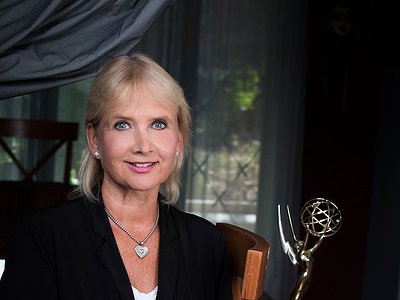Collaborations can take on many forms. What role do they play in your approach and what are your preferred ways of engaging with other creatives through, for example, file sharing, jamming or just talking about ideas?
Professionally I have two partners: Michael McCuistion and Kristopher Carter, collectively known as Dynamic Music Partners. They are each brilliant composers, inspiring me to be a better composer. On a rare occasion we actually compose something together, such as a theme for a series, but for the most part we divide up the work, each of us working in our own studio. We share ideas, themes, etc. by uploading to Dropbox. I have also collaborated on songs with lyricists over the years. I find it to be quite stimulating and inspiring to engage with other creative people.
Could you take us through a day in your life, from a possible morning routine through to your work? Do you have a fixed schedule? How do music and other aspects of your life feed back into each other - do you separate them or instead try to make them blend seamlessly?
My normal waking time is somewhere around 6:30. The past year and a half I have increased my daily walking steps to 10,000 steps in the morning, I find that my mind is much more clear after my morning walk. Usually meetings are scheduled generally at 10 or 2. It depends what I am working on. I am a big fan of keeping a structured schedule. I have pretty much everything in iCal, currently managing about 8 different calendars. Separate calendars for each production, personal calendar, a calendar for The Alliance for Women Film Composers (I am the current president) and so on. Having my days planned out helps not only my peace of mind knowing that my responsibilities are clearly laid out, but also - seeing time off, time for myself - vacation time, social activities, etc.
I do delineate between work and personal time. Sure, sometimes it is not possible. We all know of intense deadlines, where pretty much all hands are on deck and there is very little time for anything other than getting a particular project completed, but too much panic and mayhem in racing towards deadlines (which usually means there has been poor planning early on) can have a snowball effect, affecting everything from one’s health, to personal relationships, not to mention the quality of work.
Could you describe your creative process on the basis of a soundtrack or album that's particularly dear to you, please? Where did the ideas come from, how were they transformed in your mind, what did you start with and how do you refine these beginnings into the finished work of art?
My “Overture to Light” received its US premiere at Carnegie Hall this past Fall. That was a thrilling moment for me. If I rewind to 4 years earlier, this work was originally composed for a youth orchestra in Latvia, as part of the World Latvian Association gathering. It was a commissioned work - not for very much money, but for the love of doing it. I was composing a work celebrating my parents generation, them fleeing their homeland of Latvia, coming to America. It was a story. It was meaningful to me, with a deep focus and a charge to create art of some sort. I put my entire heart and soul into it, without expectations of any kind of career reward, merely for the love of the message of the piece. I truly believe that the reason it has continued to have a life past the initial performance is due to the fact that it came completely out of love and a deep commitment to the message of the piece.
There are many descriptions of the ideal state of mind for being creative. What is it like for you? What supports this ideal state of mind and what are distractions? Are there strategies to enter into this state more easily?
The non-ideal state of mind for being creative for me is panic, panic that has been self imposed due to procrastination. I do not have this very often, but on rare occasion when I have procrastinated and then must produce something of value I despise that feeling. Others soar under pressure. Me - not so much.
Strategies to enter into a creative state for me involve silence - and visualization. Quieting my mind to the point of blankness, then begin painting the blank canvas….first the oboe plays a haunting phrase as the violin harmonics weave in and out … etc. etc. Be still - let the music in. If you are in a constant state of noise, social media, TV, phone, cell phone, noise, how are you supposed to let the music in? There is no room!
How do you see the relationship between the 'sound' aspects of film music and the 'composition' aspects? How do you work with sound and timbre to meet certain production ideas and in which way can certain sounds already take on compositional qualities?
I love sound design. Any opportunity I have to preview what the sound designer has in mind before I begin writing is extremely useful. We are often competing for the same frequencies, so why not try to eliminate the competition and make it more about collaboration?
Our sense of hearing shares intriguing connections to other senses. From your experience, what are some of the most inspiring overlaps between different senses - and what do they tell us about the way our senses work? What happens to sound at its outermost borders?
Simply by closing ones eyes music sound differently. For me the sense of sight and hearing are the most common senses that interact with one another. But this is a very interesting question. It makes me want to compose something after tasting a delicious papaya, or after petting my cats Oscar and Emmy.
Art can be a purpose in its own right, but it can also directly feed back into everyday life, take on a social and political role and lead to more engagement. Can you describe your approach to art and being an artist?
Music can evoke such deep emotions. That is extremely powerful. I am deeply moved when I sense that my music has had a meaningful effect on someone. It is a responsibility and a gift that I cherish, and treat with the utmost of respect. I have tremendous admiration for those who work as music therapists. Music truly has the power to heal.
As for politics - I know that music can be a powerful voice. As an example, in my parents' homeland, Latvia, part of the fall of communism in 1990 was in part due to the singing revolution in Latvia and Estonia. There were so many demonstrations against Soviet occupation where the voices joined together in song to protest the occupation. It was a cry for freedom.
I do not think our current administration in the US has any interest in the arts, or the importance of the arts in our society. I do think it is a powerful time for all artists to create and show their outrage at the injustices happening in our country.
It is remarkable, in a way, that we have arrived in the 21st century with the basic concept of soundtracks still intact. Do you have a vision of music, an idea of what film music could be beyond its current form?
With the recent swell of popularity of film music festivals and concerts, my hope is that the art of film music will evolve even further, welcoming all listeners to experience the magic of an orchestra, as well as embracing the power music has by commenting on a film, enhancing an emotion, evoking and emotion. For some, accessibility of film music is what draws them in.
On the flip side, I am hopeful that our industry is embracing the need for a range of compositional voices. There are so many stories to tell by an array of storytellers. We need more women, people of color, a reflection of society represented in our musical scores. Why on earth would Hollywood want to limit itself to a narrow window of voices, when there is such an abundance of talent ready to inspire.



